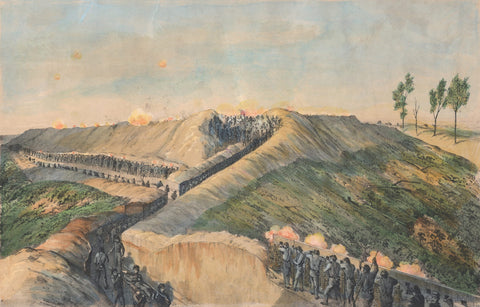
An Ohio English Teacher Went to Fight in the Civil War. And Got His First True Taste of Battle
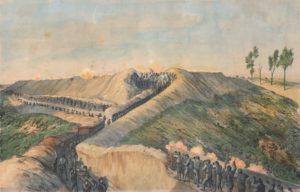
On May 20, 1863, Thomas L. Evans, a lieutenant in the 96th Ohio Infantry, lamented in a letter to his brother: “We are still stationed here guarding this post while the army is taking Vicksburg.” The “here” was Louisiana’s Sommerset Plantation, which belonged to ardent secessionist John Perkins Jr., a member of the Confederate Congress. Evans’ regiment was part of the force detached at Sommerset while the bulk of Maj. Gen. John McClernand’s 13th Corps pressed on toward Vicksburg. Fearful he would miss the capture of the Mississippi River bastion, he felt “exceedingly confident that it must fall in a day or two if it is not already ours. So we will not be in the fight.” His optimism for a quick end to the siege was premature.
After two attempts to batter through the Vicksburg defenses were bloodily repulsed on May 19 and 22, Union commander Maj. Gen. Ulysses S. Grant informed his corps commanders to “immediately commence the work of reducing the enemy by regular approaches.” To conduct the siege phase of his campaign to capture the city and open the Mississippi River, Grant needed to gather all his forces. Evans and his comrades moved to join the rest of their brigade, commanded by Brig. Gen. Stephen Burbridge, already in the siege lines facing the city. The regiment arrived in early June; not only had Evans badly miscalculated how long the Confederates would hold out, he was also there to witness—and record—the surrender.
A native of Marysville, Ohio, Evans had turned 23 on April 17, 1861—just three days after the surrender of Fort Sumter—but he decided to go into teaching rather than fight. In 1861, he earned a degree from Otterbein University in Westerville, Ohio, a progressive university that opened its doors in 1847 as a coeducational institution and was on a stop along the Underground Railroad. In August 1862, however—the outcome of the war still in doubt—Evans joined Company C of the 96th Ohio Infantry as a second lieutenant.
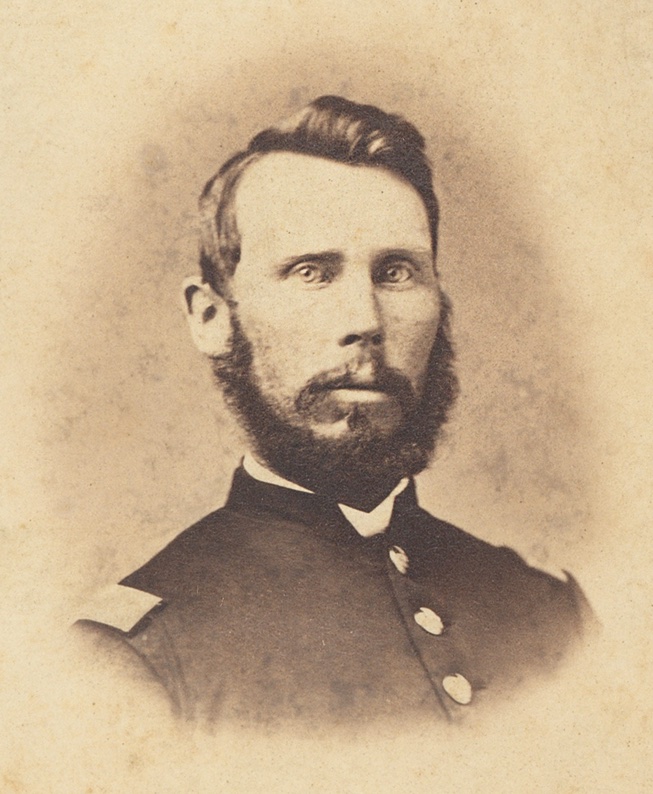
During the regiment’s 12-day stay at Camp Delaware, the religious Evans reported, with apparent relief, that his “fellow officers are indeed not very pious but they are truly moral and addicted to no vices which is indeed very fortunate for me and you may all rest assured that when I return, I will still be the same boy, at least I hope no worse.” Picking up bad habits from his comrades would be the least of his worries during his nearly three years of service.
After the brief stay at Camp Delaware, the regiment was sent to Kentucky in response to offensives by Confederate forces commanded by General Braxton Bragg and Maj. Gen. Edmund Kirby Smith. Although the 96th did not partake in the major fighting in Kentucky, in particular the Battle of Perryville, it was part of the Union forces left in the state during the fall.
Like many Civil War soldiers, Evans became sick quickly after the regiment began its extended encampment, probably with dysentery. Since most Civil War deaths were the result of disease and not battle wounds, his parents must have been distressed to read, “I have tasted nothing but medicine for 48 hours and ate but little for two or three days before [that] so I am getting pretty weak.”
To assuage his parents’ concerns, he penned a short note two days later, promising to write often, “at least till I get right stout again so you need not have any uneasiness about me.” By the next day, he was able to eat full meals and walk about camp for up to a quarter mile at a time, news that certainly reassured his parents. Although he was on the mend and would be out of the hospital within two days, he shared news that many others were not so fortunate: “[T]here is a good deal of sickness in camp now [and] much of it very serious.”
Evans was fully recovered when the 96th marched out of their encampment in mid-October, pressing to catch Confederate forces under Brig. Gen. Humphrey Marshall near Lexington. Although the Ohioans did not confront Marshall’s forces, they did gather up Confederates who became separated from Smith’s and Bragg’s retreating columns. During the remainder of the fall, Evans encountered increasing numbers of slaves who freed themselves when Union forces arrived. “Some of them,” he told his sister, were “pretty bright looking and well enough dressed, others ragged and forlorn looking beings.” Being in one of the slave states that had not seceded placed Union officers in a difficult position regarding those slaves who fled, something Evans and his comrades saw firsthand. Some “owners went to the Col. [Joseph W. Vance] and wanted him to hunt them up for them but he told them he did not do that kind of work nor allow any other man to search his camp”; however, he did tell the slaveowners “where they could find them.”
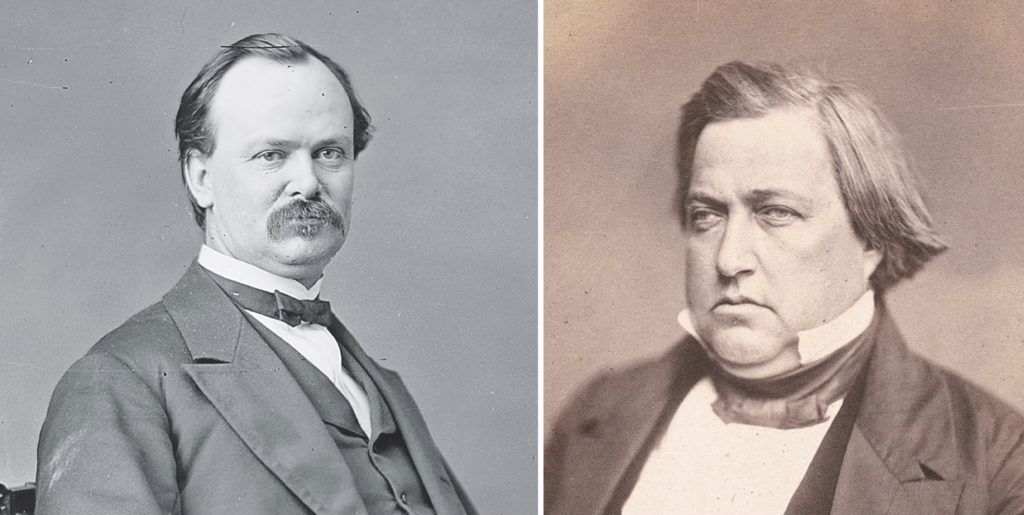
Despite having encountered mostly secession supporters during his first months in Kentucky, he and his comrades appreciated the reception they received in Paris in late October. There, despite arriving after dark on a cool mid fall night, “The town was well illuminated and [United States] flags waved everywhere and shouts for the union arose from every point but the colored population was the more numerous and the more exultant part.” They saw “heads out of the upper story windows and candles before their face showing a broad grin that seemed to say Old Abes proclamation [the Preliminary Emancipation Proclamation had been issued on September 22] is made good. (The army says Amen to that.)” The regiment remained in Kentucky until mid-December, at which time the regiment boarded the transport Hiawatha for transfer to Louisiana.
It is unlikely local White residents were as receptive to the Union forces as the supporters in Kentucky when they reached Youngs Point, La.—across the Mississippi River from Vicksburg—in late January 1863. The Ohioans remained across from the fortified Confederates, watching, for three months before being sent north to Milliken’s Bend in mid-March. Used primarily as a reserve force, the 96th spent a month there before moving to Perkins Plantation, where it remained for yet another month.
The 96th continued to sit on the sidelines as Grant isolated Vicksburg in late April and May through a series of battles in Mississippi at Grand Gulf, Port Gibson, Raymond, Jackson, and Champion Hill before encircling the city. With the siege finally at hand, Evans and his comrades got the chance to join the front lines.
In his first letter home after the 96th reached the Vicksburg lines, Evans regaled his father with a description of the bombardment of the city: “It is indeed beautiful to see the shelling and would be more so were it not so moonlight. To see the mortars throwing the shells up up up so high then rool [sic] down and when near the ground the quick bright flash followed by a roar that seems to pass with one continued bound from one rugged hill to another and before it dies away followed by others and grand as we sit on the hills or in the rifle pits and watch them.”
With more than a little satisfaction, he also boasted he and his comrades “have almost quit dodging at the crack of a cannon or whiz of a shell.”
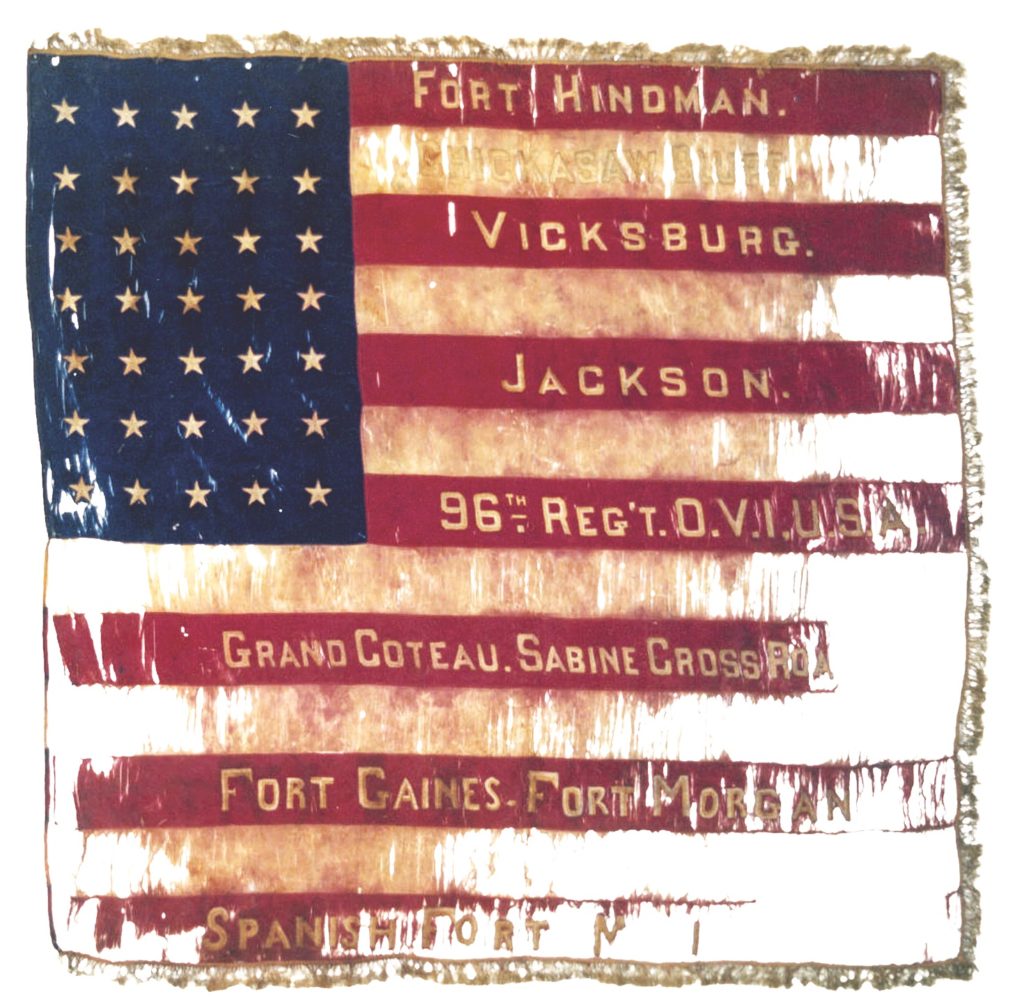
Arriving at the siege after Grant’s May 19 and 22 attacks on the Confederate defenses, Evans and the rest of the 96th Ohio spent the next month working on their lines, making them “much stronger by making improvements in our rifle pits and planting cannons along them,” and watching the systematic destruction of the Confederate positions by Union artillery. While few men around him were lost to Confederate fire, the heat and humidity of the Mississippi summer began to take a toll. Although he withstood it, “quite a number of the boys have the chills and fever.”
Grant’s decision to settle into a siege meant Vicksburg was subjected to heavy and frequent bombardment. On June 20, “at 4 o’clock the guns along our whole line opened on them until 10 o’clock it was one continuous roar of cannon from the little 6 pound field piece to the 220 pound mortars.” To Evans, it looked “like it would not be a very healthy place to live,” still “the rebs did not say quit once so we just kept on until we got tired and quit of our own accord.”
After nearly a month holding their positions in the center of the Union lines, sweltering in the heat, one monotonous day after another, Evans finally got the chance to participate in the action. On June 26, he wrote his father “We went up to the front 200 yards from the reble works and laid there from three o’clock until 5,” when “the rebles opened on us.” The Union forces responded and “in five minutes there was a perfect roar of musketry and cannon all along our lines for miles from the river above to the river below….The shells were bursting over them thick and our troops were firing rapidly with their muskets.” The firing kept up until dark, at which time his command returned “to camp with not a man hurt.”
Despite the pyrotechnics, Evans and his comrades were part of the secondary front. The day before, Grant’s sappers exploded a mine under an earthen fort known as the Louisiana Redan, on the northern shoulder of the Confederate defenses, several miles to the right of the 96th Ohio’s position. The mine was detonated at 3:30 p.m., lifting clouds of earth and destroyed equipment into the air and covering the field in smoke and dust. However, it did not have as devastating an impact as Grant had hoped. The Confederate commander in the redan had realized Union sappers were tunneling under the fort, pulled the Louisiana men out of the fortification, limiting the mine’s impact. Union troops rushed into the breach but were turned back after a costly 36-hour struggle.
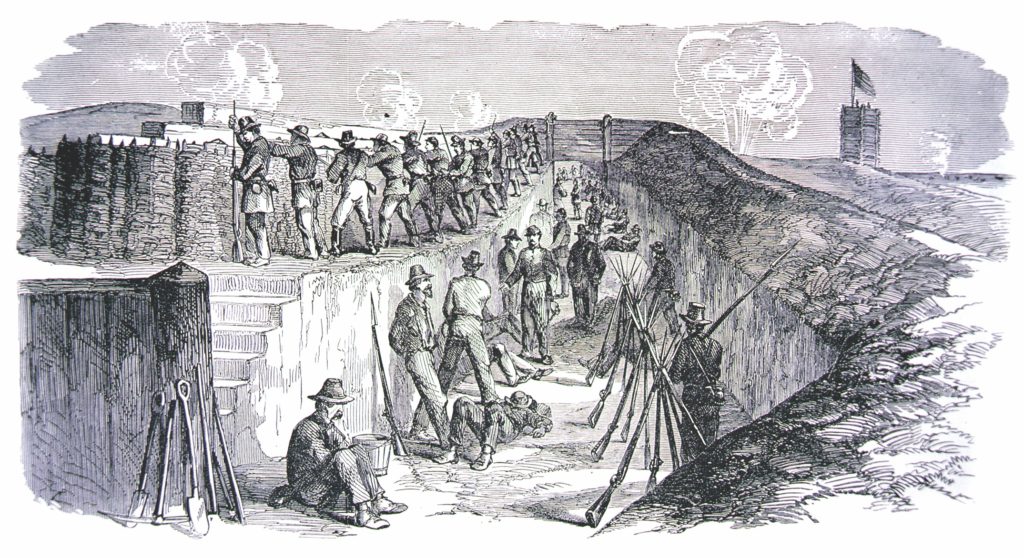
With Lt. Gen. John C. Pemberton’s men firmly holding a defensive line beyond the crater, most of Grant’s force, including Evans and his comrades, returned to their monotonous daily routine. For Evans that meant, “The work of digging rifle pits near the reble forts is still progressing.” The sapper units, however, kept busy digging tunnels underneath the Confederate position facing the crater left by the June 25 explosion. On July 1, Evans informed his sister that he anticipated being ordered out on an attack before the end of the day, in conjunction with the next detonation. While the mine was exploded, the attack never materialized. Grant chose to avoid a repeat of the bloodbath of the 25th. Evans was relieved when no attack order came, admitting, “I am not very anxious to move toward Vicksburg until the rebs in that direction become a little more tame.”
Although Evans did not know it, the siege was nearly over. On July 3, he witnessed the beginning of its last day when Confederate Maj. Gen. John Bowen and Lt. Col. Lewis M. Montgomery, one of Pemberton’s staff officers, approached the 96th Ohio’s lines under a flag of truce. Fortunately, Evans recorded what transpired in a letter to his mother:
Battle Field near Vicksburg,
July 3rd, 1863
Dear Mother:
The weather has been very warm the past two or three days & things have been very monotonous as usual about camp but the monotony was broken this morning. About 8 o’clock this morning the cry was there is a flag of truce coming.
In a few minutes we were up on the rifle pits and all the reble works & ours were covered with men. They lined up out of the pits & came into sight as if by magic.
In a few minutes here came Gen. Bowen & Col. Montgomery Reble bearers of dispatches from Gen. Pemberton to Gen. Grant. They passed us each blindfolded and led by a Federal officer.
They the Rebs remained on their works while we remained on ours in many places only a few yds apart but no conversations was allowed. However they would stray off from both sides and get together & we have some curious specimens of conversation between them. Curiosity was on tip toe now. What was up? Did the rebles want to surrender? A thousand rumors were afloat not one of which was believed. Thus things remained until about noon when the dispatch bearers returned to their own works & Both Armies Hunted their holes, as we say here that is they all disappeared in the same way that they appear[ed] in the morning. In about an hour we receive the following note
“The rebles this day offered to surrender Vicksburg on conditions but Gen. Grant refuses anything but an unconditional surrender.” As this was official we know it is so but of course know nothing of what the conditions are. That was about three hours ago. Now there is another flag of truce over and the Reble Officers are in consultation with Gen. Grant at his Head Quarters. Thus thing[s] stand & tomorrow is the 4th & I shall wait till then to finish.
July 4th Vicksburg is ours. That is all I can say No other words can express my feelings.
More than six months ago we left Memphis to take Vicksburg & now it is ours & though it has cost terribly we can now rejoice in triumphant success. What would I not give to day to whisper in your ears Vicksburg is ours. But before you get this you will know the truth.
After six months such as we have spent well may we rejoice. But of the 80 of us who left Memphis only 40 are here to witness our success & when we look around for our friends & miss them our pleasure is mared by their absense. But they have fallen in a good cause & not in vain. Thus we are deeply impress[ed] with the conflicting emotions of joy & sorrow joy for our success & sorrow for the fallen.
The 4th of July has a new meaning to me now. I have rejoiced & spent many happy hours on the 4th But never before felt as I did when I saw the rebles hoist the white flag on the row of forts in our front at ten o’clock this morning. The terms of surrender are unconditional [actually, Grant did assent to a few concessions] and the details are arranged between the generals. Quinbies [Brig. Gen. Isaac F. Quinby’s] Division of the 17th Army Corps are to go into town & take charge of the prisoners. Where we will go or what we will do of course we know not. There will of cours be a force left here to hold the plase. Where the rest will go I know not. Some may [think] so to Port Hudson some North & some after Jackson in our rear hear. I would rather go to Port Hudson than stay here. If all the people in the North were loyal & would rejoice with us, and rush to our support and crush Lee’s forces in the East now is the time to crush this Rebellion, speedily and effectively but if the North are divided and stand still and let Lee go on as he has started I can see no end to this war – nothing but a continued war from year to year but I still have faith in and rely on the loyalty of the North.
My health continues good and the health of the Co. has improved. With love to all I remain
Your affectionate son,
Thomas
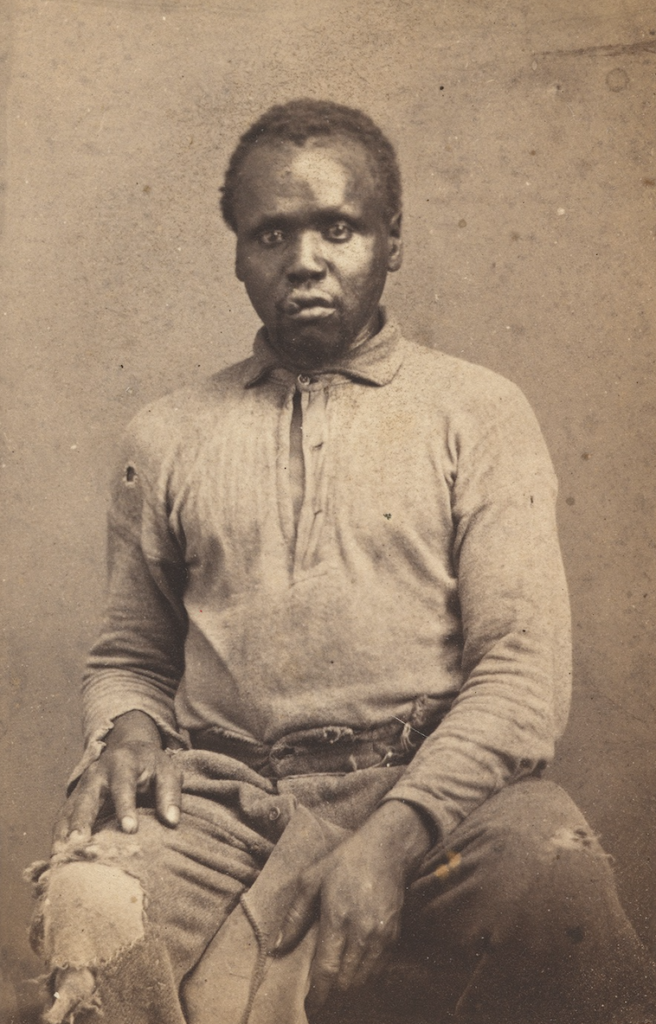
There was little time for Evans and the rest of Smith’s division to savor the great victory. After just one day, Maj. Gen. William T. Sherman headed east to attack Confederate forces under Gen. Joseph Johnston, gathered at Jackson. The move to capture the Mississippi state capital proved costlier to Evans than had his time in the siege lines at Vicksburg. During an initial assault on the city on July 10, teenager Ashbury Turner—“one of the best boys we had and as good and brave a soldier as ever lived”—was hit by a solid artillery shot. “He fell with a shriek,” Evans wrote. “His left hip and leg shot off with a cannon ball and bowels gushing out.”
Although Evans wished he could remain with the dying boy, he knew he had to catch up to the advancing regiment as it closed on the Confederates. This assault, and a larger one two days later, failed to carry the Confederate works. Realizing he could not endure a siege and that his escape would soon be cut off, Johnston abandoned Jackson on July 16. After helping to tear up railroad tracks, the regiment, including a sick Evans, returned to Vicksburg on July 24, remaining there for a month.
The campaign to capture the key Mississippi River port city had ended, but Evans had two more years of active service ahead of him. Those years proved more challenging than the first with his regiment. After a fall spent in Louisiana and a winter in eastern Texas, Evans next participated in the early stages of the Red River Campaign. He was captured at the April 8, 1864, Battle of Mansfield, La., where his regimental commander, Colonel Vance, was killed. Eventually the Confederates forced the Union prisoners captured at Mansfield to march 125 miles to Camp Ford in Tyler, Texas.
Three weeks after being captured, he warned his parents, “We may be exchanged in a month or two and may not for a year so it is doubtful you will hear from me.” It was neither; his exchange took place on October 23, 1864. After processing, he returned to his regiment, now with the rank of captain. The following spring, he served during the surrender of the key Confederate port city, Mobile, Ala., on April 12. The 96th remained in Mobile until June, then disbanded. Evans was mustered out on July 7, 1865, in Decatur, Ill.
Once mustered out of the Army, Thomas Evans returned to Marysville, where he married Anna E. Childs less than six months after his discharge, on January 3, 1866. He returned to the education field, first as a principal for numerous schools in Lafayette, Ind., before eventually moving to Illinois to help organize a high school in the town of Paxton, roughly 110 miles south of Chicago. In 1880, he left Paxton to become principal of the public school in Sangamon, a position he held for six years, before being elected to one term as the superintendent of all Sangamon County, Ill., schools. Defeated for reelection, he immediately returned to Paxton as superintendent, where he remained until stepping down in 1904. The couple had two children.
Evans died May 10, 1916, nearly 53 years after he sat outside the rifle pits at Vicksburg, watching two Confederate officers pass, blindfolded, to initiate the surrender of the city.

